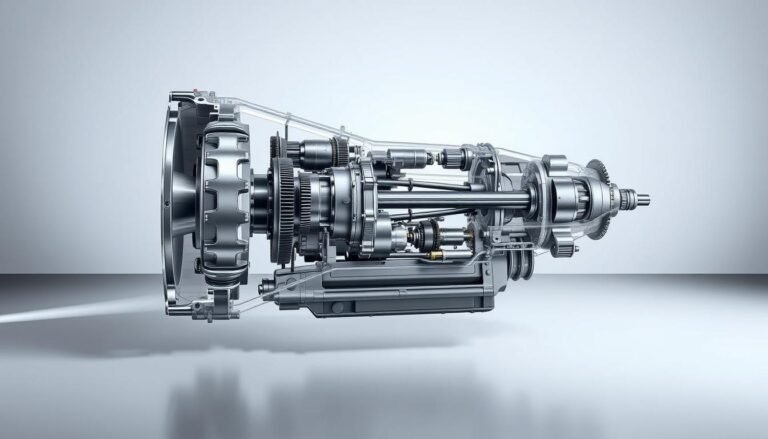How Much Ford F250 Diesel Mpg? Exclusive 9 Efficiency Uncovered
How efficient is the Ford F250 Diesel MPG? The Ford F250 diesel engine is known for its great fuel efficiency. It’s a top choice for heavy-duty trucks in the U.S.
Knowing how much fuel your Ford F250 uses can make driving better, whether you’re towing or hauling heavy loads.
This article explores what affects the Ford F250’s fuel efficiency and compares it to others.
We’ll look at key specs, why the diesel engine is important in the F250, and share real-world mpg results.
You’ll also get tips to get the best mpg for your Ford F250 diesel. This way, you can drive confidently and save money on gas.
What is Ford F250 Diesel Specifications?
The Ford F250 comes with powerful diesel engines, like the 6.7L Power Stroke V8. It has two versions: the standard and a high-output one.
The standard engine makes 475 horsepower and 1,050 lb-ft of torque. The high-output engine boosts power to 500 horsepower and 1,200 lb-ft of torque.
Both engines use a 10R140 10-speed automatic transmission. This ensures smooth shifting and better driving.
When looking at the ford f250 diesel specifications, consider the rear axle ratios. These ratios affect performance and fuel use.
You can choose from 3.55:1 and 3.73:1 ratios, depending on your needs. These diesel specs not only boost performance but also include the latest technology.
Turbocharging increases power while keeping efficiency high. The advanced fuel system ensures great combustion, leading to strong torque and speed. This is key for heavy-duty tasks.
| Specification | Standard 6.7L Power Stroke V8 | High-Output 6.7L Power Stroke V8 |
|---|---|---|
| Horsepower | 475 hp | 500 hp |
| Torque | 1,050 lb-ft | 1,200 lb-ft |
| Transmission | 10R140 10-speed automatic | 10R140 10-speed automatic |
| Rear Axle Ratio Options | 3.55:1, 3.73:1 | 3.55:1, 3.73:1 |
The Importance of Diesel Engines in The F250
Diesel engines in the Ford F250 are very important. They provide more torque, which is key for towing and hauling heavy loads.
This is vital for both work and fun activities. These engines last longer than gasoline ones, giving you more value over time.
Their strong build and lower RPMs help them handle heavy-duty tasks without wearing out fast. Diesel engines also save on fuel.
They are made to use less gas, and turbocharging boosts their performance. This makes them great for different heavy-duty tasks while keeping fuel costs down.
Real-World Ford F250 Diesel MPG Results
Looking at the Ford F250’s fuel efficiency, real-world tests give us a clear picture. The 2020 Ford F250 gets about 19.2 MPG.
This puts it right up there with other trucks in its class. The 2020 Chevy Silverado HD, for example, gets 19.9 MPG, just a bit better.
This comparison shows both trucks are top-notch in the diesel market. They offer great fuel efficiency without losing power.
Comparison with 2020 Chevy Silverado HD
The 2020 Chevy Silverado HD is a big name in diesel trucks. The Ford F250 is close behind in fuel efficiency.
Both trucks have powerful diesel engines, perfect for those who want to save on gas but need lots of power.
Here’s a quick look at how they stack up:
| Vehicle | Real-World MPG |
|---|---|
| Ford F250 (2020) | 19.2 MPG |
| Chevy Silverado HD (2020) | 19.9 MPG |
Performance of New High-Output 6.7L Power Stroke Diesel
The new 6.7L Power Stroke Diesel in the Ford F250 is a real winner. It gets an average of 19.6 MPG, beating the gas version’s 16.6 MPG.
This shows how valuable the diesel engine is, even for heavy-duty tasks. Fuel economy is key for balancing work and efficiency, even in tough driving conditions.

Factors Affecting Ford F250 Diesel MPG
Knowing what affects your Ford F250’s fuel efficiency is key. The factors include how you use the truck and the fuel quality. Knowing these can help you get the most out of your vehicle.
Impact of Towing and Hauling on Fuel Efficiency
Towing affects your Ford F250’s fuel economy a lot. Heavier loads need more power, which uses more fuel. Things like weight, trailer design, and where you drive also play a big role.
For example, hauling heavy things often lowers your MPG. Knowing this helps you plan better for towing.
Role of Fuel Quality in Mileage
The quality of diesel fuel directly affects your F250’s MPG. Using better fuel can improve your truck’s efficiency.
On the other hand, low-quality diesel can make your truck use more fuel. Choosing a good fuel provider can really help. Even small changes in fuel can save you money in the long run.

Driving Conditions and Their Effect on Fuel Economy
It’s important to know how different driving conditions affect the Ford F250 diesel’s fuel economy.
City driving, with lots of stops and starts, uses more fuel and lowers efficiency. But, driving on highways at a steady speed can make the vehicle more fuel-efficient.
Driving in mountains is tough because the vehicle needs more power to climb. This makes it use more fuel.
On flat ground, the fuel economy is better, allowing for better performance and mileage.
Weather also matters a lot. Wind resistance can really hurt fuel economy, even more in bad weather like heavy winds or rain.
This makes the engine work harder to keep speed, using more fuel. So, knowing about driving conditions helps a lot in understanding their impact on fuel economy.
| Driving Condition | Impact on Fuel Economy |
|---|---|
| Urban Driving | Increased fuel consumption due to frequent stops and starts. |
| Highway Driving | Steady speeds lead to improved fuel economy. |
| Mountain Driving | Higher fuel consumption required for elevation changes. |
| Adverse Weather | Wind resistance and poor conditions increase fuel consumption. |

Maximizing Ford F250 Diesel MPG: Tips and Tricks
To get better fuel efficiency from your Ford F250, try some simple tips. These can help you save money on gas. Focus on good driving habits and regular maintenance to boost your diesel’s MPG.
Best Practices For Highway Driving
For better fuel economy on highways, follow these tips:
- Keep your speed steady, between 55-65 mph.
- Use cruise control to avoid sudden stops and starts.
- Don’t speed up quickly or brake hard, as it wastes fuel.
- Try to avoid lots of stops and starts, which can lower your MPG.
Maintenance Tips To Improve Fuel Efficiency
Regular maintenance is key to keeping your engine efficient. Here are some tips:
- Change your oil on time to keep your engine running well.
- Replace air filters to ensure good airflow to your engine.
- Make sure your tires are at the right pressure.
- Fix any mechanical problems quickly to avoid fuel efficiency drops.
| Maintenance Task | Frequency | Impact on Fuel Efficiency |
|---|---|---|
| Oil Change | Every 5,000 miles | Improves engine operation |
| Air Filter Replacement | Every 15,000 miles | Enhances airflow, boosts mileage |
| Tire Pressure Check | Monthly | Reduces rolling resistance |
| Mechanical Inspections | Every 30,000 miles | Identifies and fixes issues |

Upgrades To Enhance Ford F250 Fuel Efficiency
Improving your Ford F250’s fuel economy is possible with various upgrades. These modifications can significantly boost fuel efficiency and performance.
Many owners look for ways to cut down on fuel costs and improve efficiency without losing power.
Common Upgrades That Impact MPG
Several upgrades can greatly affect your F250’s MPG. Here are some options to consider:
- Cold Air Intakes: These systems improve airflow to your engine. Better airflow means more efficient combustion, which can increase MPG.
- Performance Exhaust Systems: New exhaust components reduce back pressure. This allows exhaust gases to escape more smoothly, improving engine performance and efficiency.
- Engine Tuning: Adjusting your engine’s computer can optimize fuel delivery and timing. This can lead to better efficiency without losing power.
- Tires Selection: Low rolling resistance tires can greatly improve fuel efficiency. They offer better mileage on both highways and city streets.
Pros and Cons of Fuel Additives
Fuel additives are another way to boost fuel efficiency in your Ford F250. It’s important to know the benefits and drawbacks before adding them to your routine.
| Fuel Additive Type | Pros | Cons |
|---|---|---|
| Fuel Injector Cleaners | Improves injector performance, better combustion. | May not be effective for severely clogged injectors. |
| Octane Boosters | Enhances engine performance, better in high-compression engines. | Higher cost compared to regular fuel. |
| Diesel Fuel Additives | Improves lubrication, enhances cetane rating. | Potential increase in emissions if used excessively. |
Ford F250 Diesel MPG: Performance Over Time
The Ford F250 Diesel MPG has improved a lot over the years. Early models didn’t do as well, often getting lower mpg than today.
Thanks to better engine design and fuel systems, the F250 has gotten much better. Today’s F250 models are a big step up, thanks to turbocharging and advanced fuel injection.
These changes boost power and fuel efficiency. This means you can drive smoothly, even when carrying heavy loads.
To show how much the F250 has improved, here’s a table comparing its fuel economy over the years:
| Model Year | Engine Type | MPG (City) | MPG (Highway) |
|---|---|---|---|
| 2010 | 6.4L Diesel | 12 | 18 |
| 2015 | 6.7L Diesel | 15 | 20 |
| 2020 | 6.7L Power Stroke Diesel | 21 | 26 |
| 2023 | 6.7L Power Stroke Diesel | 22 | 27 |
These numbers show how the F250’s fuel economy has gotten better over time. Thanks to new tech and engineering, it meets today’s needs better.
If you’re thinking about getting a Ford F250, look at these numbers to help decide.
Conclusion
In our detailed look at the Ford F250 Diesel MPG, we’ve seen its big benefits. Its strong diesel engine makes it a great choice.
It offers power and good fuel economy, making it perfect for those who need reliability. Real-world data shows that with the right care, your Ford F250 can be very fuel-efficient.
It’s important to keep it well-maintained and drive it right. Upgrades can also help improve its mileage and performance.
As an owner, you have everything you need to improve your F250’s performance. By following the tips and making smart upgrades, you can save money and enjoy your truck more.
Start making smart choices today to get the most out of your Ford F250.
FAQs
Q: What is the fuel efficiency of the Ford F250 Diesel?
A: The Ford F250 Diesel gets about 19.2 MPG on highways. The new 6.7L Power Stroke Diesel gets around 19.6 MPG.
Q: How can I improve the gas mileage on my Ford F250?
A: To get better gas mileage, drive smoothly on highways. Keep up with regular maintenance like oil changes and air filter replacements. Also, make sure your tires are at the right pressure.
Q: What are the best upgrades for improving Ford F250 Diesel MPG?
A: Upgrades like cold air intakes and performance exhaust systems can help. Advanced engine tuning and using fuel additives wisely are also good choices.
Q: How does towing affect the Ford F250’s diesel MPG?
A: Towing heavy loads lowers MPG. This is because of the extra weight and drag it causes.
Q: What is the advantage of choosing diesel over gasoline for the Ford F250?
A: Diesel engines have more torque for towing and hauling. They also last longer and are more fuel-efficient than gasoline engines.
Q: How do driving conditions impact the fuel economy of the Ford F250?
A: City driving with lots of stops and starts lowers MPG. But driving on highways at steady speeds improves it. Weather and elevation also affect fuel economy.
Q: How has Ford F250 Diesel MPG evolved over the years?
A: The Ford F250 has gotten better over time. New engine tech and design have led to better fuel efficiency in recent models.







